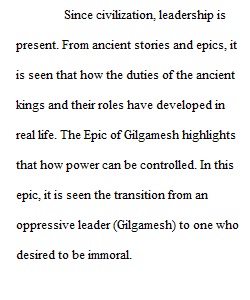


Q For this module, we read the epic of Gilgamesh, an Ancient Mesopotamian story about one man's quest to realize his true potential as a king and as a human being. For the present module on Ancient Egypt, we read a brief piece in your text ("Guidelines for the Ruler" p. 12) in which a pharaoh offered advice to his son about how to be a good king. For Reflection One, I would like you to compare and contrast the guidelines for being a good ruler represented in "Guidelines" to the lessons taught/implied/suggested on the same subject in Gilgamesh. Your discussion can be wide-ranging. Whereas "Guidelines" is very specific with its subject, many of the moral and ethical lessons taught in Gilgamesh intersect and interrelate with one another- hence, the instruction that Gilgamesh offers on how to be a good person is perfectly analogous to its advice on how to be a good ruler-- and the two may be discussed interchangeably. Please see the "Assignment Descriptions" document in Module One: Orientation Materials for a description of my expectations for the Reflections. If you have any questions, please do not hesitate to be in contact. I look forward to reading your ideas!
View Related Questions